|
|
|
Sort Order |
|
|
|
Items / Page
|
|
|
|
|
|
|
| Srl | Item |
| 1 |
ID:
104194
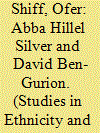

|
|
|
|
|
| Publication |
2010.
|
| Summary/Abstract |
During the years immediately preceding Israel's founding, Abba Hillel Silver was considered the most powerful leader of American Zionism. His leadership was viewed by numerous admirers as epitomising the yearning of the Jewish people after the Holocaust. However, almost immediately after Israel's foundation, he was relegated to the margins of Zionist politics; the more important reasons for this development being his status vis-à-vis the leader of the pre-state Jewish community, David Ben-Gurion, who was elevated to the revered status of the 'founding father' of the recently established state. This article discusses how Silver coped with this new situation, where only his great rival could legitimise him. After realising the futility of challenging Ben-Gurion directly, Silver decided to elevate Ben-Gurion in his speeches to the status of the ideal philosopher-king. The question is whether by doing so Silver accepted the incontestability of Ben-Gurion's charismatic leadership, or whether he was merely attempting to reinterpret Ben-Gurion's new revered status in a way that legitimised his own Diaspora leadership, thus reinforcing a very different national ideology from the Israelocentric one represented by Ben-Gurion.
|
|
|
|
|
|
|
|
|
|
|
|
|
|
|
|
| 2 |
ID:
190993
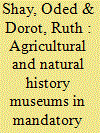

|
|
|
|
|
| Summary/Abstract |
The establishment of agricultural and natural history museums in Jerusalem (1920) and Tel Aviv (1925) by individual and institutional Jewish entrepreneurs was a corollary of the wave of exhibitions and fairs in Western countries that swept across Mandatory Palestine’s Jewish community (Yishuv) in the 1920s. Yet it also reflected Zionist ideals and perceptions and as such served as a catalyst for providing modern agricultural education to the Yishuv’s urban classes.
|
|
|
|
|
|
|
|
|
|
|
|
|
|
|
|
| 3 |
ID:
073692
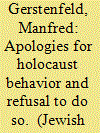

|
|
|
| 4 |
ID:
041357
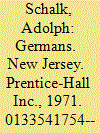

|
|
|
|
|
| Publication |
New Jersey, Prentice-Hall Inc., 1971.
|
| Description |
xxix, 521p.Hbk
|
| Standard Number |
0133541754
|
|
|
|
|
|
|
|
|
|
|
|
Copies: C:1/I:0,R:0,Q:0
Circulation
| Accession# | Call# | Current Location | Status | Policy | Location |
| 010060 | 943.087/SCH 010060 | Main | On Shelf | General | |
|
|
|
|
| 5 |
ID:
096641
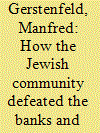

|
|
|
|
|
| Publication |
2010.
|
| Summary/Abstract |
In the mid-1990s there was a sudden renewed public interest in the issue of looted Jewish possessions during the war and their very partial restitution afterward. In the Netherlands, public interest in restitution issues gradually reemerged after several decades of almost total silence. In the late 1990s, public inquiries focused on the government, banks, insurers, and the Amsterdam Stock Exchange. At the turn of the twentieth century, the Amsterdam Stock Exchange was controlled by the major Dutch banks. The restitution negotiations between the Jewish umbrella-body CJO and the exchange therefore became part of those with the Dutch Banking Association (NVB). After exceedingly low financial proposals by the exchange, the representatives of Dutch Jewry in the Netherlands and Israel involved the World Jewish Congress (WJC) in the negotiations. The WJC in turn approached the Hevesi Committee of American comptrollers. Seeing the American business of their members threatened, the NVB agreed to increase the offered payment more than thirtyfold.
|
|
|
|
|
|
|
|
|
|
|
|
|
|
|
|
| 6 |
ID:
188231
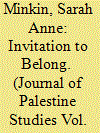

|
|
|
|
|
| Summary/Abstract |
This essay takes as its starting place the “present absentee” status of Palestinians in U.S. and Jewish discourse and engagement with Israel/Palestine. Ethnographic fieldwork in Jewish American communities demonstrates practices that reiterate a dynamic of Jewish belonging against the presence of Palestinian absence. The essay explores different initiatives to challenge this systemic exclusion of Palestinians, including public programs that amplify Palestinian voices and normalize hearing Palestinians as experts in their own lives and an experimental study group with Jewish American leaders that centers Palestinian perspectives in an effort to cultivate radical empathy. Insights gained in these initiatives point to the importance of articulating fuller visions of community and belonging in engagement with Israel/Palestine.
|
|
|
|
|
|
|
|
|
|
|
|
|
|
|
|
| 7 |
ID:
129346
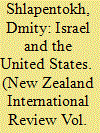

|
|
|
| 8 |
ID:
026850
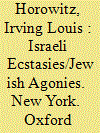

|
|
|
|
|
| Publication |
New York, Oxford University Press, 1974.
|
| Description |
x, 244p.hbk
|
| Standard Number |
0195017471
|
|
|
|
|
|
|
|
|
|
|
|
Copies: C:1/I:0,R:0,Q:0
Circulation
| Accession# | Call# | Current Location | Status | Policy | Location |
| 013696 | 956.9405/HOR 013696 | Main | On Shelf | General | |
|
|
|
|
| 9 |
ID:
092288
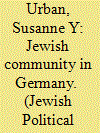

|
|
|
|
|
| Publication |
2009.
|
| Summary/Abstract |
This article deals with the diverse images of Jews in Germany: which roles they take upon themselves and which symbolic roles German society sees in the Jewish community. The author tries to unfold the origins and the meaning of these roles including Jews as victims, as sensors toward anti-Semitism and right-wing extremism. The symbolic roles of Jews in Germany cannot be compared to those in other countries, as in Germany the real presence of Jews is publicly very important as "proof" that the country has developed into a democracy and a diverse, open society. Nevertheless Jews are also taken as responsible for Israel's policies and as such are targets for condemnation. Therefore, the roles which are put upon the Jewish communities and citizens are exchangeable depending on what German society needs and wants to see in the Jews.
|
|
|
|
|
|
|
|
|
|
|
|
|
|
|
|
| 10 |
ID:
097788
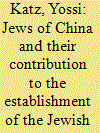

|
|
|
|
|
| Publication |
2010.
|
| Summary/Abstract |
This article deals with the contribution of Zionists throughout the world to the building of the National Home in Palestine, including the Zionist communities in the Far East - India and China. It examines the vast Zionist activity taking place in China, with the Zionists of China making a significant contribution, especially considering the small size of its Jewish community. In contrast to popular belief, in the period discussed in our research China was not distant and disconnected from the Zionist centres in Palestine and Europe. Written Zionist propaganda and Zionist representatives did not overlook China. The notable extent of donations and investments made by the Jews of China benefiting the National Home through the Jewish Colonial Trust, the Jewish National Fund, and the Foundation Fund is the result of two main factors: firstly, the economic strength of the community, especially the very wealthy Iraqi Jews, and secondly, the Zionist passion of the Chinese Jews. The Kadoorie family, whose donations assisted in purchasing land for the Hebrew University, the building of Ha'emek Hospital, and the establishment of the Galilee agricultural school, played a pivotal role. There is no doubt that Eliezer Kadoorie serving as head of the Zionist Organization in China as well as some of its institutions helped widen the circle of donors among upper and middle class Zionists in China, and shared in their prominent part in creating the Jewish National Home in Palestine.
|
|
|
|
|
|
|
|
|
|
|
|
|
|
|
|
| 11 |
ID:
174009
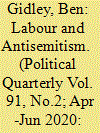

|
|
|
|
|
| Summary/Abstract |
In this article, we argue that Labour’s antisemitism crisis has been misunderstood. We suggest that a more accurate and sophisticated understanding of antisemitism offers a way forward. There are three elements to this claim. First, by drawing on existing data on attitudes towards Jews, we criticise the widespread focus on individual ‘antisemites’, rather than on the broader problem of antisemitism. In turn, we conceive of antisemitism not as a virus or poison, as in so many formulations, but rather, as a reservoir of readily available images and ideas that subsist in our political culture. Second, following on from this understanding, we offer five ways forward. Finally, we set this analysis in the context of a historical parting of the ways between anti‐racism and opposition to antisemitism. An anti‐racism defined solely by conceptions of whiteness and power, we argue, has proven unable to fully acknowledge and account for anti‐Jewish racism.
|
|
|
|
|
|
|
|
|
|
|
|
|
|
|
|
| 12 |
ID:
096642
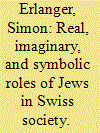

|
|
|
|
|
| Publication |
2010.
|
| Summary/Abstract |
Numbering just under eighteen thousand, Jews constitute a tiny fragment of Switzerland's population of 7.7 million. Nevertheless, Swiss public discourse is preoccupied with things Jewish. This goes back at least as far as the first centralized Swiss state. The Helvetic Republic, founded in 1798, fell apart largely over the issue of Jewish emancipation. This issue remained at the very center of the Swiss political discourse up to 1868 when, under U.S. and French pressure, Switzerland granted equal rights to the Jews. Having benefited from foreign intervention, Jews in Switzerland have come to symbolize unwanted change and foreign influence. Moreover, the special, bottom-up character of the Swiss body politic, with its semiautonomous cantons and communities, has enabled medieval stereotypes to survive into modernity. The medieval image of the Jew as the religious Other has thus transformed into the image of the Jew as the essential Other against which, for most of the twentieth century, Swiss identity was defined.
|
|
|
|
|
|
|
|
|
|
|
|
|
|
|
|
| 13 |
ID:
096415
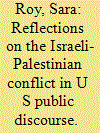

|
|
|
|
|
| Publication |
2010.
|
| Summary/Abstract |
This essay argues that the climate of intimidation and fear surrounding a more critical discussion of the Israeli-Palestinian conflict in the United States has begun to change. Despite the obstacles that still remain, a counterdiscourse challenging dominant conceptualizations and understandings of the conflict, particularly Israel's role, has not only emerged but also gained growing legitimacy and weight. These changes can be found in academia (at all levels of the educational hierarchy), civil society, and policy circles. Some of the most dramatic changes have occurred within the U.S. Jewish community in which an oppositional movement-in part, generational-has grown increasingly strong and well organized, ending any notion of a Jewish consensus on Israel.
|
|
|
|
|
|
|
|
|
|
|
|
|
|
|
|
| 14 |
ID:
134812
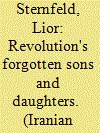

|
|
|
|
|
| Summary/Abstract |
The 1979 revolution in Iran was one of the most popular revolutions of the twentieth century. It was supported by all the classes of Iranian society, and crossed social strata, positions, and religious affiliations. A lot is known about the participation of different parts, such as students, urban professionals, religious leaders, bazaaris, and leftists, yet little is known about the participation of Jews in the revolutionary movements. This article sheds light on a little-known event in the life of the Jewish Iranian community and seeks to tell the story of different segments of the Jewish community during the tremulous years of the “Islamic Revolution.” This article examines two main arenas in which the Jews facilitated the revolution—the Society of Jewish Iranian Intellectuals, and the Sapir Charity Hospital in Tehran—and seeks to draw attention to the minorities' contribution to the most important national revolution in Iran.
|
|
|
|
|
|
|
|
|
|
|
|
|
|
|
|
| 15 |
ID:
180028
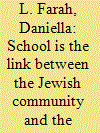

|
|
|
|
|
| Summary/Abstract |
This article offers a thematic examination of the significant role education played among the Jews of Iran from the mid-1940s to the late 1960s. I focus on the work of the Alliance Israélite Universelle, the Franco-Jewish philanthropic organization which established its first school in Iran in 1898. The Alliance – which viewed Iranian Jews as backwards and degenerate – aimed to modernize them via Western education. In this article, I demonstrate that the Alliance’s work in Iran helped the Jews move up the socio-economic ladder and provided them with opportunities to integrate into the broader non-Jewish Iranian milieu. By exploring the disputes that arose between the Alliance and local Iranian Jews, I also show that Iran’s Jews did not always accept the Alliance’s paternalistic attitudes. To discuss the overall impact of education on Iranian Jews, I situate the history of Jewish education in Iran within the Pahlavi state’s nationalizing campaigns.
|
|
|
|
|
|
|
|
|
|
|
|
|
|
|
|
| 16 |
ID:
138845
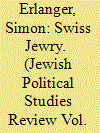

|
|
|
|
|
| Summary/Abstract |
In 2010, after 146 years of continuous existence, the Jewish community of Lucerne seemed to be on the verge of disappearance. There were only sixty, mostly elderly members. Hugo Benjamin, head of Lucerne’s Jewish community, announced to the media: “I do not know how to go on. In the whole of the canton of Lucerne and central Switzerland, there are only 300 active Jews.” He suggested turning the synagogue—built in 1912 on the model of the neo-Orthodox Frankfurt synagogue, Friedberger-Anlage, into a museum.
|
|
|
|
|
|
|
|
|
|
|
|
|
|
|
|
| 17 |
ID:
146790
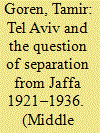

|
|
|
|
|
| Summary/Abstract |
The ordinance granting Tel Aviv the status of local council was given in 1921. Immediately thereafter, the municipal council acted to amend the terms of the ordinance so as to free Tel Aviv entirely from the supervision of Jaffa municipality. Tel Aviv aimed for the status of an independent municipality, but still wished to safeguard its interests in Jaffa. Detachment from Jaffa was for long a central issue for Tel Aviv municipality. The article analyses the Jewish side's stance on Jaffa from 1921 until the outbreak of the disturbances in 1936, when Tel Aviv detached itself almost entirely from Jaffa. In the 1920s, the importance of Jaffa for the Jews was mainly economic, but in the 1930s, the addition of the demographic dimension reflected the growing status of the Jaffa Jewish community and was decisive in increasing the Jewish influence in Jaffa.
|
|
|
|
|
|
|
|
|
|
|
|
|
|
|
|
| 18 |
ID:
084584
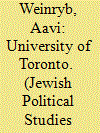

|
|
|
| 19 |
ID:
073696
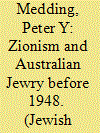

|
|
|
|
|
|
|
|